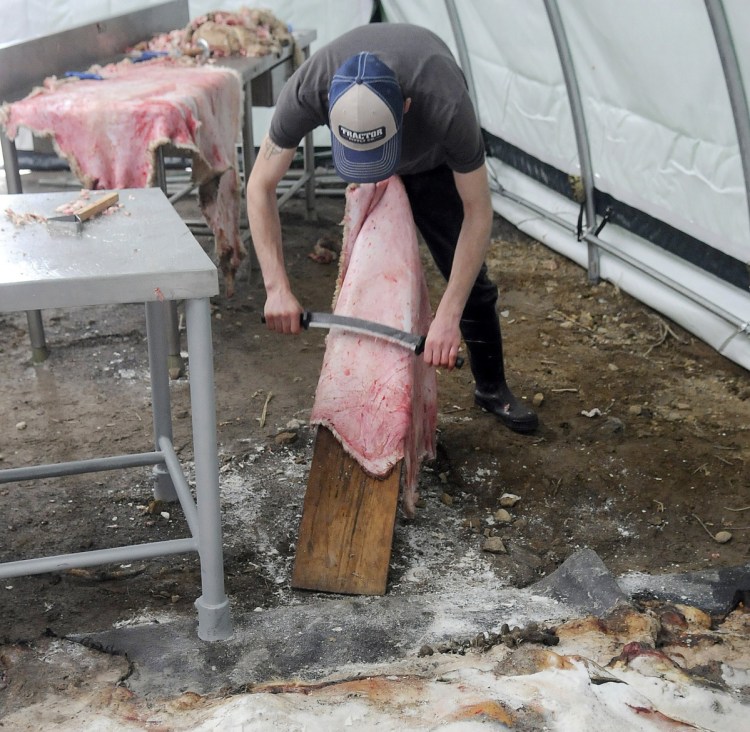In a blow to the local food economy, Central Maine Meats, an ambitious company built on the vision of multiple USDA-inspected meat processing facilities in Gardiner, filed for bankruptcy protection Wednesday, according to court records.
Barely three years in operation, and funded heavily by over $4 million dollars in state grants and federal government loans, Central Maine Meats is between $100,000 and $500,000 in debt to 64 creditors, including the Internal Revenue Service, UPS and Central Maine Power and the city of Gardiner.
It has assets of less than $50,000, according to the filing.
The state-of-the-art facility, intended to boost and support the local food economy in Maine, opened in 2015. For Bill Lovely, who owns the buildings, Central Maine Meats was an expansion of an earlier meat processing plant, Northeast Meats, which he co-owned with his wife, Anette Lovely, and had opened in 2013. In 2014, Lovely bought a lot in the Libby Hill Business Park where he planned to open a slaughterhouse with an eye to the increased efficiencies of having livestock slaughtered and then cut and packed within a 3-mile radius. By the next year, the core of what he envisioned was up and running, rolling out in stages over the course of 2014.
Central Maine Meats handles beef, pork and lamb. (Lovely also owns a building which is licensed for USDA-inspected poultry processing and leased to Common Wealth Poultry, which is an independent business, has grown to 30 employees and is not associated with the bankruptcy filing.) Among the services Central Maine Meats offers is halal meat processing, invaluable to Maine’s growing Muslim community, which entails Muslim butchers handling the slaughter.
“We started doing that a few weeks ago,” co-owner Joel Davis said in March.
A long-awaited smokehouse had just opened, and Davis described business in glowing terms.
“Things are going swimmingly,” Davis said.
His bankruptcy petition was filed April 18.
Neither Davis nor his bankruptcy attorney, James Molleur, responded to requests for comment Thursday.
Lovely said Thursday he is no longer an owner of the business, simply the landlord, and was unaware of the bankruptcy filing.
“I knew absolutely nothing about that,” he said, adding that ownership transferred to Davis in the last 30 to 60 days.
“Joel Davis owns 100 percent.”
When it opened three years ago, Central Maine Meats was the first new USDA-inspected meat processing and packing facility to open in Maine in decades. That USDA stamp of approval is required in order to sell meat across state lines, and for many livestock farmers, Central Maine Meats represented a way to fill a void, geographically. Other USDA-inspected slaughterhouses in Maine include Curtis Custom Meat in Warren, Herring Brothers in Guilford and the Windham Butcher Shop.

Central Maine Meats co-owner Joel Davis walks in 2016 in an area of his business that he planned to develop as pens for the firm’s slaughterhouse in Gardiner. The meat processing company, which received more than $4 million in state and federal grants and loans, has filed for bankruptcy.
Maine has its own inspection process for slaughter and processing facilities, and there are five such businesses in the state. But that meat can only be sold within state lines.
For some livestock farmers, the news that Central Maine Meats is in financial trouble was not a surprise. Leo Thibodeau of Thibodeau’s Ache’N Bacon Farm in Lyman said on two occasions he negotiated with a manager there to bring pigs to slaughter only to have the orders canceled when he was en route, animals in tow. He said he was told that Central Maine Meats had found pigs elsewhere and no longer needed to buy his animals.
“I get somewhere probably around Cumberland, maybe a little beyond and Bill (Lovely) calls and says, ‘Never mind.’ ” Now, Thibodeau drives to New Hampshire or Pennsylvania, where he says he gets a fair price.
“I don’t even consider Central Maine Meats,” he said.
The city of Gardiner has worked closely with Central Maine Meats and its associated businesses to support their operation. In 2016, Central Maine Meats was awarded $690,000 in federal economic development funds, administered by the state, on top of an earlier $640,000 in state funding.
The same year, the USDA announced a $2,645,000 guaranteed rural development loan to Bill and Anette Lovely to refinance debt and provide working capital for the business. In announcing that loan, USDA state director Virginia Manuel described the processing facilities as strengthening Maine’s agricultural communities. “Investments like this one have a tangible economic impact on seven area businesses and 84 local jobs,” Manuel said in a news release at the time.
Patrick Wright, the city of Gardiner’s economic and community development coordinator, said he was aware that Lovely had sold the company to Davis but he, too, was caught off guard by the bankruptcy filing. The city will stand by Central Maine Meats, he said.
“Bankruptcy does not mean the business is closing,” said Wright. “It is legal protection against debts, and we would work with them in any way so they can emerge from that bankruptcy protection.”
Deborah Johnson, the director of Maine’s Office of Community Development, which administered the community block grants awarded to Central Maine Meats, said the company’s decision to restructure its debt has no impact on past grants, and possibly not on future grants either – although that, she said, would be subject to review by the department’s outside counsel.
“They don’t owe us any money,” Johnson said. “It does not affect anything because they performed and were successful and closed their grant.”
Central Maine Meats won the Maine Sunday Telegram’s Source award for “Newcomer” in April 2016.
Mary Pols can be contacted at 791-6456 or at:
mpols@pressherald.com
Twitter: MaryPols
NOTE: This story has been updated to clarify that Central Maine Meats and Common Wealth Poultry are separate meat-processing businesses, and Common Wealth Poultry is not involved in the bankruptcy proceedings.
Send questions/comments to the editors.


